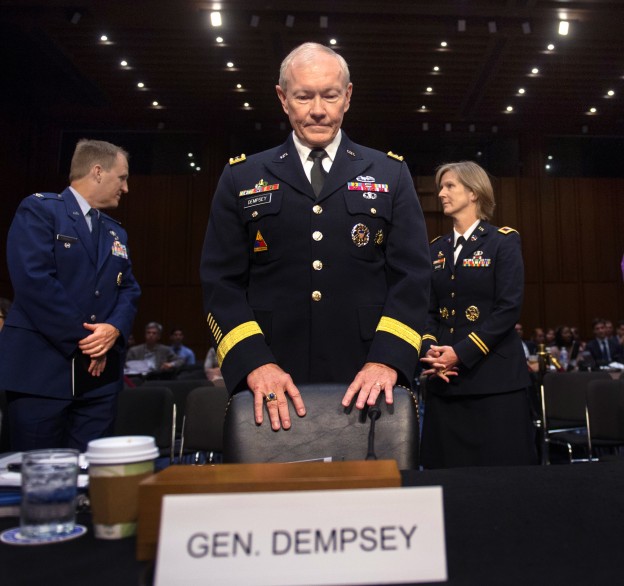
How far the United States should go in supporting the Syrian opposition, and just what the role of the Chairman (and Vice Chairman) of the Joint Chiefs of Staff in formulating that strategy should be, dominated the sometimes testy re-confirmation hearing of Gen. Martin Dempsey and Adm. James Winnefeld on 18 July.
Dempsey’s re-confirmation is not assured. A key member of the panel—Arizona Republican John McCain—was so upset by Dempsey’s answers on Syria that he threatened to put a hold on the nomination. The chairman of the committee offered a possible compromise to get the nomination for a second Dempsey term back on track. Winnefeld did not come under that kind of scrutiny.
Saying that he supported increased aid to the opposition, Sen. Carl Levin (D-Mich.), the chairman of the Senate Armed Services Committee, asked Dempsey to provide to the committee in the next few days “a list of options and your personal assessments of the pros and cons of those options” in Syria.
“Absolutely, as well as a framework to a strategy,” Dempsey said—then returning to a point he had made often in the hearing: The decision to use force or follow a particular policy was a political decision, and not that of the senior military adviser.
As the hearing concluded Levin said he hoped for “a speedy confirmation and markup [of the defense authorization bill], but that’s up to the full committee.”
During the hearing, McCain said the situation in Syria “is much more dire” today than it was two years ago, when Dempsey and Winnefeld were confirmed. He called changes in the U.S. approach to Syria “pirouettes”—at times not supporting the opposition (sometimes seemingly dominated by Islamists) with arms, at others considering the imposition of a no-fly zone, or, to another of saying it will supply arms—but doing so slowly.
McCain said he viewed any American military action as “trying to stop a massacre that’s going on” that has claimed 100,000 Syrian lives and sent more than 1 million others to refugee camps, primarily in Jordan and Turkey.
Saying he has provided the president with military options in Syria, Dempsey said, “It would be inappropriate for me to try to influence the decision with me rendering an opinion in public about what kind of force we should use.”
Republican Senators—among them Saxby Chambliss of Georgia and Lindsey Graham of South Carolina— worried that the conflict could de-stabilize American allies such as Turkey, and friendlies such as Iraq, Lebanon, and Jordan while threatening Israel and at the same time bolstering Iran and Hezbollah’s influence in the region.
While conceding the conflict in Syria “tends to ebb and flow,” the regime of Bashar al-Assad seems to be holding the upper hand in the central and western parts of the country, both officers agreed.
“The tide seems to have shifted in [Assad’s] favor,” Dempsey said. When asked who was winning, Winnefeld answered, “the regime, but not by much. . . . Assad is going to fight to the death” even if Russia stops supporting his government militarily.
Dempsey said that if the situation remains as it is—Russians supporting the regime with Iran and Hezbollah also on that side—the chances were “likely so” that Assad would still be in power a year from now.
He also said the United States was trying to “bundle our efforts together” with other countries in aiding the opposition, but declined to name them in an open hearing, or describe what particular steps the administration has taken in that direction.
Looking at future relationships with Afghanistan, Dempsey said, “Relations with the president of Afghanistan is scratchy.” He said several times during the hearing that the withdrawal of U.S. and NATO forces was on track. But for U.S. forces remain after 2014, it would be crucial to have a bilateral agreement on their role and status.
Levin told Dempsey, who is scheduled to meet with Afghanistan’s President Hamid Karzai later this week, “Make that clear. Sometimes he acts like he doesn’t want a residual force”—which likely would be 8,000 Americans and 4,000 NATO troops in Afghanistan.
When asked what would happen if no U.S. or NATO forces remained after the deadline, Dempsey said Afghan security forces—even numbering 325,000 men—“would not have the level of confidence” needed to control the country.
Weighing different aspects of the effect of sequestration now and in the future, Winnefeld zeroed in on the readiness of Air Force fighter pilots. Telling ranking member Sen. James Inhofe (R-OK) that there are costs of retraining aircrews who were grounded to meet an additional $52 billion in defense cuts for this fiscal year, he said it was more to the point to note that it takes “one to three months to buy back their airmanship skills; another three months to get back their combat skills.”
He later added that the Air Force grounded nine fight squadrons because of sequestration and other types of squadrons were flying less to keep within spending limits.
Dempsey said sequestration highlights two problems over time. “The immediate problem for next several years will be readiness”—that a smaller force in the future that may be ready, but not large enough to meet the crisis. “We’ll go, but we may not be ready to go.”
On the Navy’s most expensive shipbuilding program for the future, Winnefeld said the Defense Department is “committed to the triad” and that the follow-on to the Ohio-class ballistic missile submarine is needed because it is “the most survivable platform.” “We’ve delayed it about as long as we can.”
When asked about Guantanamo Bay, Dempsey said the United States needed the option to “detain prisoners” at some location, adding that what has happened at the facility there has “tarnished the image of the United States.”
Dempsey and Winnefeld emphasized the need to hold commanders accountable for sexual abuse and that the judgment of how to proceed in those cases should not be taken out of commanders’ hands.





